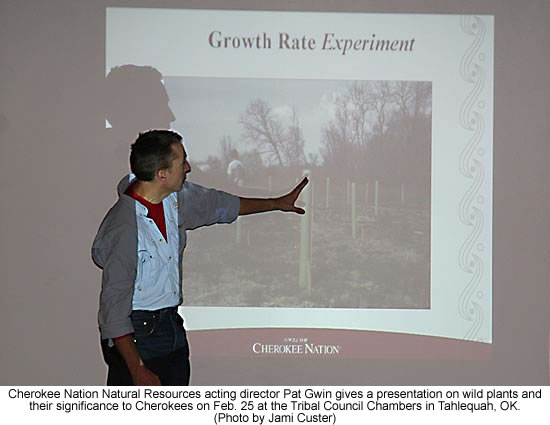 |
Canku Ota
|
 |
|
(Many Paths)
|
||
|
An Online Newsletter
Celebrating Native America
|
||
|
May 1, 2010 - Volume
8 Number 5
|
||
|
|
||
|
Cherokee Nation Ethnobiology
Programs Revitalize Tribal Culture
|
||
|
by Christina Good Voice
- Indian Country Today Staff Writer
|
||
|
TAHLEQUAH, Okla. – In late February, Cherokee Nation Natural Resources acting director Pat Gwin gave a presentation at the Tribal Complex focusing on certain wild plants and their significance to Cherokee history and culture.
He said many Cherokee elders remember venturing into the woods with their parents and families to gather necessities, which included food and medicines the wild plants provided. “A lot of this knowledge has been forgotten. Unfortunately, with each passing elder more and more is forgotten,” he said. Gwin has worked for the CN for the last 18 years, the last 10 with Natural Resources. He has a biology degree from Northeastern State University in Tahlequah. He said Natural Resources has devoted years to gathering valuable morsels of information from Cherokee elders to pass on to other Cherokees about different trees and plants, their uses and significance. “I’m not an expert in Cherokee ethnobiology,” Gwin said. “The experts in Cherokee ethnobiology say there are no experts.” But Cherokee ethnobiology is something that his department is using to help in culture revitalization, health benefits, genetic preservation and service. “Ethnobiology is a controversial topic that has lots of different definitions, but our definition today is we’re going to be dealing with plants that have cultural ties to the Cherokee Nation,” he said. The Cherokee tribe and most other North American tribes had their own way of using science to find uses for plants, he said. “Prior to European influence, Cherokees – and basically all North American Indigenous peoples –had a system that a lot of western science European influence would say is primitive. But it’s not primitive; it’s different,” Gwin said. “Their system was very natural science-based as opposed to physical science-based. There was no separating the natural environment from the everyday environment.” Another ethnobiology program the department is working on is its popular seed bank program. “This is the time of year we’re actually giving these seeds away,” Gwin said. “We raise about 20 different varieties of heirloom plants: corns, beans, squashes, tobaccos and rare trees.” All of the plants have ties all the way back to North Carolina, which is the Cherokee tribe’s original tribal homeland, he said. “We have a lot of Cherokees that no longer have ties to the Cherokee Nation,” Gwin said. “They live way off and they have this longing to belong to the Cherokee Nation. We have a lot of California Cherokees that grow these crops and send them back to us.” The department grows its garden using and producing the heirloom seeds west of the CN Tribal Council House. It began distributing seeds earlier this year for the program. “This where every seed that we started with (was grown,)” Gwin said. More than 6,000 seed packets were mailed to CN citizens throughout the United States and other areas last year. |
|
|
||
|
|
||
| Canku Ota is a free Newsletter celebrating Native America, its traditions and accomplishments . We do not provide subscriber or visitor names to anyone. Some articles presented in Canku Ota may contain copyright material. We have received appropriate permissions for republishing any articles. Material appearing here is distributed without profit or monetary gain to those who have expressed an interest. This is in accordance with Title 17 U.S.C. Section 107. | ||
|
Canku Ota is a copyright ©
2000, 2001, 2002, 2003, 2004, 2005, 2006, 2007, 2008, 2009, 2010
of Vicki Barry and Paul Barry.
|
||
 |
 |
|
|
The "Canku
Ota - A Newsletter Celebrating Native America" web site and
its design is the
|
||
|
Copyright ©
1999, 2000, 2001, 2002, 2003, 2004, 2005,
2006, 2007, 2008, 2009, 2010
of Paul C. Barry.
|
||
|
All Rights Reserved.
|
||
